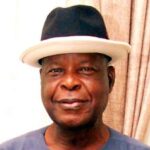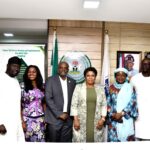By Stella Odueme
The Federal Government and the World Bank have urged state governments to increase their investments in the Nigeria Sustainable Urban and Rural Water Supply, Sanitation, and Hygiene (NG-SURWASH) initiative.
This effort aims to expand access to clean water, sanitation, and hygiene services across urban and rural areas, ensuring that more Nigerians benefit from improved health, water security, and overall well-being.
Speaking at the High-Level Roundtable Meeting for the Midterm Review (MTR) of SURWASH in Abuja, Minister of Water Resources and Sanitation Engr. Prof. Joseph Terlumun Utsev emphasized that the meeting’s objective was to update and assess performance while charting a path forward for the programme’s implementation among participating states.
A statement by the Director of Information and Public Relations, Mrs. Funmi Imuetinyan on Thursday said the Minister outlined specific objectives, including a review of the SURWASH Programme’s status at its midterm stage and discussions on implementation challenges needing the attention of state governors. He noted the underutilization of state systems for the programme, which affects cash flow and hinders the achievement of desired results.
Prof Utsev urged participating states to take ownership of the programme’s implementation and enhance their participation to achieve better results, stressing that their ongoing dedication is vital for the long-term health and development of their communities.
He called for a collaborative approach to tackle these pressing challenges.
The Minister also emphasized the critical importance of the SURWASH initiative in Nigeria and encouraged other interested states to join, in order to enhance access to water, sanitation, and hygiene (WASH) services for Nigerians in both rural and urban areas.
Katsina State Governor, Mallam Dikko Umaru Radda, reiterated the critical need for urban and rural water supply and hygiene in Nigeria. He noted that states are beginning to better understand the SURWASH Programme, acknowledging that low implementation rates stem from a lack of clarity. Radda called for further roundtable discussions involving the Federal Ministry of Water Resources and Sanitation, the World Bank, and participating states to enhance cooperation. He also encouraged other interested states to join the initiative.
Dr. Ndiame Diop, the World Bank Country Director for Nigeria, applauded the Minister for championing the programme and thanked participating states for their dedication to its implementation. He stressed the urgent need to improve WASH service investments in the country, highlighting significant shortcomings in these essential services.
Dr. Diop called for state governors—who play a vital role in the SURWASH program—to actively participate in enhancing WASH services for their communities, emphasizing how better access to clean water and sanitation can greatly improve public health and quality of life. He underscored the need for more states to join the initiative.
Present at the meeting were the Minister of Women Affairs, Representative of the Honourable Minister of health, representatives of the participating states, World Bank representatives, and Water Resources Stakeholders.



